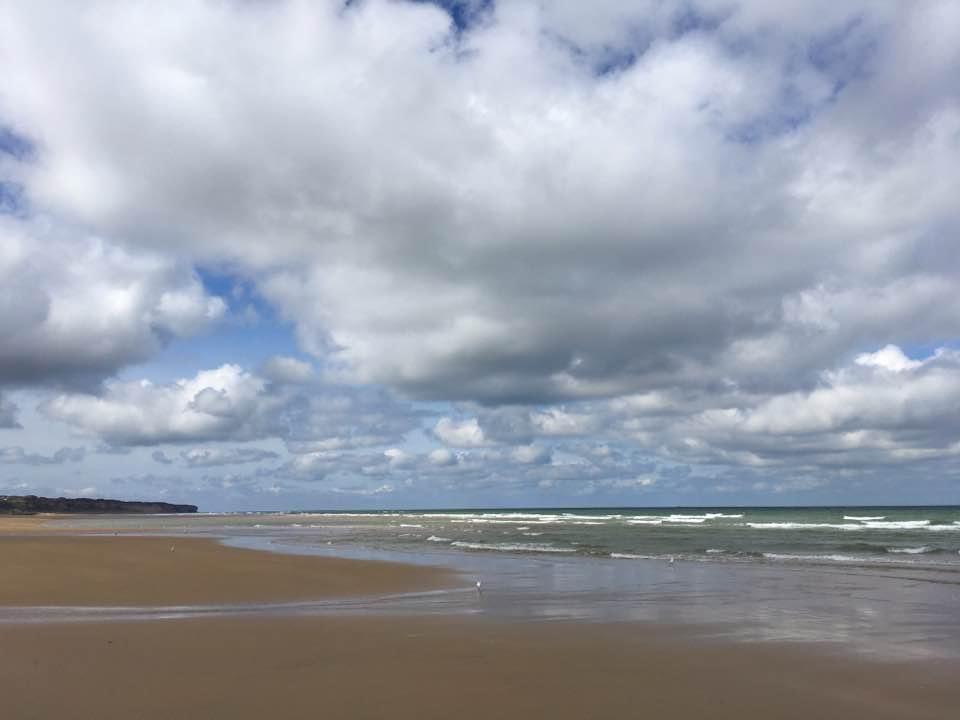Wind and tide have erased the anguish of that awful day: June 6, 1944. Today, Omaha Beach is a serene space, albeit holy and haunted, too. At low tide, it is unimaginably wide; the thought of traversing it under withering fire is almost too much to comprehend. The sights and sounds and smell of battle are gone now, but the images of D-Day and its heroes remained fixed in our mind’s eye. We have to look away.
Five years ago, I walked on Omaha Beach and found a tiny shell—an auger—on the tide line. It was the only shell I saw one the beach that day. Its fragile delicacy seemed a promise fulfilled: that somehow, we survive and the world heals and carries on. I brought the shell home with me and a jeweler friend of mine was able to fix it to a gold chain; a simple, elegant necklace. I gave it to my wife as a Christmas gift. She wears it carefully and likes to tell its singular story.
It may be true that time heals all wounds, but I think that’s a lot to ask of time. I doubt that those who survived D-Day ever forgot the things they saw on the beaches of Normandy that bloody day. I’m sure the same is true for the parents, family members, and friends who have lost loved ones to the recent spate of gun violence that continues to plague this country. Some wounds just never heal and no delicate little necklace will ever ease their pain.
Abraham Lincoln knew this truth all too well. The Gettysburg Address is only 271 words long, but it still resonates today, clear as a bell. “But, in a larger sense, we can not dedicate—we can not consecrate—we can not hallow—this ground. The brave men, living and dead, who struggled here, have consecrated it, far above our poor power to add or detract. The world will little note, nor long remember what we say here, but it can never forget what they did here. It is for us the living, rather, to be dedicated here to the unfinished work which they who fought here have thus far so nobly advanced. It is rather for us to be here dedicated to the great task remaining before us—that from these honored dead we take increased devotion to that cause for which they gave the last full measure of devotion—that we here highly resolve that these dead shall not have died in vain—that this nation, under God, shall have a new birth of freedom—and that government of the people, by the people, for the people, shall not perish from the earth.”
President Lincoln could have said the same about the soldiers who died on D-Day or, for that matter, of the innocent children and teachers killed in schools across the country, or of the shoppers gunned down in a Buffalo supermarket. There is so much unfinished work still to do and it defies all logic that so many of our elected officials refuse to do it. We truly risk perishing from the earth.
I think of the natural beauty of that little auger shell I found on Omaha Beach. It seemed so lonely and out-of-place that windy day, yet there it was, what Anne Morrow Lindbergh might have called “a gift from the sea.” I wish there were some beauty to be found in the wake of more recent events, but I can’t see it. Yet. Maybe someday, there will be new and better laws and regulations to save us from ourselves, to advance all the unfinished work that still needs to be done.
I’ll be right back.
Jamie Kirkpatrick is a writer and photographer who lives in Chestertown. His work has appeared in the Washington Post, the Baltimore Sun, the Philadelphia Inquirer, the Pittsburgh Post-Gazette, the Washington College Alumni Magazine, and American Cowboy Magazine. Two collections of his essays (“Musing Right Along” and “I’ll Be Right Back”) are available on Amazon.




Matt LaMotte says
Thank you for this touching and informative article. I got to walk the Beach a little over a decade ago and had the same eery feeling. It was a more “close-run thing” than we knew.As a recently retired History teacher, I always described D-Day as the beginning. It took over 2 months to break-out of Normandy and almost another year of fighting until of the end of fascism/nazism.
I thought…